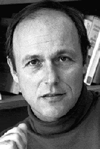 |

| |||||||||||||||||||


|
|
Search
Publisher's Weekly
 Poetry, Short Fiction, and Novel Workshops For New and Established Poets and Writers |
|
The Literary Life and How To Live It by Sean Murphy An Interview with Stephen Goodwin
Stephen Goodwin is a professor of creative writing at George Mason University and the author of two previous novels and a nonfiction book. His short fiction has appeared in Shenandoah, Sewanee Review, Georgia Review, and Gentleman's Quarterly; his reviews and nonfiction have been published in the Washington Post and Country Journal. Goodwin has also directed the literature program at the National Endowment for the Arts, and he served two terms as president of the PEN/Faulkner Foundation.
SM: First off, congratulations on your new novel! I heard some positive blurbs on NPR and all the reviews I've read have been uniformly outstanding.
SG: Thanks. There have been some good reviews, and I've learned that the best place to have a book mentioned is NPR -- because the audience for NPR is much the same as the audience of readers.
SM: Publisher's Weekly proclaims that this is your first novel in over two decades. Did you know you were going to write another novel (or, this novel) and work on it for a long time, or what reason(s) would you offer for the long time between books?
SG: Honestly, I thought I'd never write another novel. The difference on this one was that I decided starting out that I wasn't going to do it unless it was ready to come. I think I ruined fiction writing for myself by trying to force it, and I wasn't going to do that again.
SM: Did you find the process of composing a novel more arduous this time? Less? Did you feel more comfortable and/or confident as an established writer and teacher, or did that augment the self-induced pressure any committed artist feels?
SG: I felt more comfortable this time through, but not because I felt "established." The books that had been of interest to me for a while before writing this were books like "Feast of Love," by Charlie Baxter, and "We Were the Mulvaneys," by Joyce Oates. These books are full of feeling, unlike so many contemporary novels that wouldn't be caught dead in the vicinity of a real emotion. To me the passion in Baxter and Oates was liberating, and in "Breaking Her Fall" I decided I wouldn't shy away from emotion, or try to make it seem less messy than it really is. At that point the book was easy to write -- though I still had the problem of trying to put these messy feelings into a story.
SM: Writing and Teaching: I would imagine with your experience you'd be able to give a clinic on how to maintain balance between the demands of impressionable students and the demands of one's own restless muse. Care to elaborate on that?
SG: The answer is, it's impossible to keep a balance. A lot of teachers I know just don't try to write during the semester because it's so damn frustrating.
SM: Any plans to write a book on writing?
SG: Nope.
SM: If you could succinctly summarize the trajectory (thus far!) of your writing life, how different is it from what you imagined, as an earnest but unpublished author? How is it better? Worse? What things would you have changed?
SG: It's turned out completely differently from what I imagined -- which was that I would somehow walk in the footsteps of Hemingway and Fitzgerald, or at least George Plimpton. That I'd live in glamorous places, write dozens of books, catch big fish! I have caught a few fish, but I've also lived through a time when the novel has been languishing on its deathbed. Don't misunderstand me -- there are wonderful novels written now, but there aren't many readers for them. Fiction writing has become a marginal activity in our culture, while movies and TV have all the money and glamor and power. I was slower than many of my friends -- some of whom took off for Hollywood -- to realize that writing books was a tough way to make a buck, almost an impossible way. Thank god the universities have supported writers! I happen to believe that writers still do the essential work of telling the truth, which is not something of great concern to the moviemakers.
SM: MFA or No-MFA? Any comments or opinions for the folks who are adamant (pro OR con) about the value of MFA programs?
SG: It's always seemed strange to me that anyone would be ADAMANT about this. Many of our best writers have come from writing programs, and I don't think you can argue that workshops harm people. I've seen many people make huge leaps in workshops. The danger of MFA programs is more subtle and insidious -- it's the culture, it's the fact that there are now enough writing programs so that a writer can put together a career without ever having to reach the "common reader," or the public. I've heard writers claim that they don't ever consider their audience, but I think that's bull. And I think there's a huge difference between imagining that you write for a group of people of exquisitely refined sensibilities as opposed to a group of busy, active, smart folks who probably only have time to read a handful of novels in a year. I know that I wanted Breaking Her Fall to get to the "common reader," and I happen to know several common readers-my mother and my sister, for starters-they're always in a book.
SM: Again, as a teacher, if you had to say: has the writing of your students gotten better over time? Worse? The same? What positive trends have you noticed? What awful ones? Is it true to presume that regardless of genre or generation, good writing (and good writers) tend to find their way?
SG: I know that I see better students now than I did 20 years ago, but are they better writers? Time will tell. It's an unusual thing for a writer in an MFA program to be fully evolved. I have a friend, Robyn Wright, who won national awards as an MFA student, and now that she's been out of the program for five years she's writing things that are completely different -- and better, I'd say. But it takes a while for most fiction writers to hit their stride. As for trends, the huge favorite among students is still the first person, present tense narrative, though it's being pressed by an apparently urgent need that people now feel to write their memoirs. Really, I keep talking to young writers for whom that is the major project.
SM: If you had to say which writer influenced you most, and which book, what would they be? Any other notable influences, artistic or otherwise?
SG: In "Breaking Her Fall", there is a lot of music -- lots or references to Eva Cassidy and Eric Clapton. I was playing their music at the time, and I think that something about the way they engage with their art made its way into my work. I hope so. Singers and musicians let it spill out; they can't shy away from emotion, and that's the quality that I was listening for. I had their music playing the whole year that it took me to write that book.
SM: Who would you recommend as some of the better writers currently producing fiction?
SG: I've already mentioned Charlie Baxter and Joyce Oates -- amazing writers, both of them. I'd also like Jeffrey Eugenides, Jonathan Franzen, Richard Bausch, and Jane Hamilton as writers whose next book I will snap up.
SM: Any comments on the autobiographical elements in any of your novels?
SG: Only this: I decided a long time ago that I wouldn't read any book about someone whose life wasn't more interesting than my own. I wouldn't write one, either.
SM: Lastly: any advice for aspiring writers?
SG: One, remember that when you decide o write, you are starting down a long and winding path. Writing is a way of life and if you want to get to be any good, you have to keep following the path.
Two, make sure you have some good companions on the journey.
2020 Pennsylvania Ave., NW Suite 443 Washington, D.C. 20006 algonkian@webdelsol.com Phone: 1-800-250-8290 |


 Stephen Goodwin is one of the very rare and precious forces that anyone who appreciates exceptional writing would do well to celebrate. Whether you know him, have read him, or even heard of him, it is very possible that you've felt his influence. A respected writer of fiction and nonfiction, and a popular and well-regarded writing teacher, Goodwin has also made his mark-albeit in his unassuming and quietly confident fashion-as an eloquent advocate for the arts. It would, in short, be difficult to reside in the DC Metropolitan area and not have encountered his work, or felt his presence in the efforts of one of his successful students. Goodwin the writer is, not surprisingly but still refreshingly, very much like Goodwin the teacher: intelligent but unpretentious, enthusiastic but soft-spoken, connected but humble, equal parts southern gentleman and beltway insider. His latest novel Breaking Her Fall has received first-rate reviews in the press, and props from Pulitzer Prize winner Richard Ford, who celebrates Goodwin's achievement as "a true and good story of human frailty and imperfection survived."
Stephen Goodwin is one of the very rare and precious forces that anyone who appreciates exceptional writing would do well to celebrate. Whether you know him, have read him, or even heard of him, it is very possible that you've felt his influence. A respected writer of fiction and nonfiction, and a popular and well-regarded writing teacher, Goodwin has also made his mark-albeit in his unassuming and quietly confident fashion-as an eloquent advocate for the arts. It would, in short, be difficult to reside in the DC Metropolitan area and not have encountered his work, or felt his presence in the efforts of one of his successful students. Goodwin the writer is, not surprisingly but still refreshingly, very much like Goodwin the teacher: intelligent but unpretentious, enthusiastic but soft-spoken, connected but humble, equal parts southern gentleman and beltway insider. His latest novel Breaking Her Fall has received first-rate reviews in the press, and props from Pulitzer Prize winner Richard Ford, who celebrates Goodwin's achievement as "a true and good story of human frailty and imperfection survived."